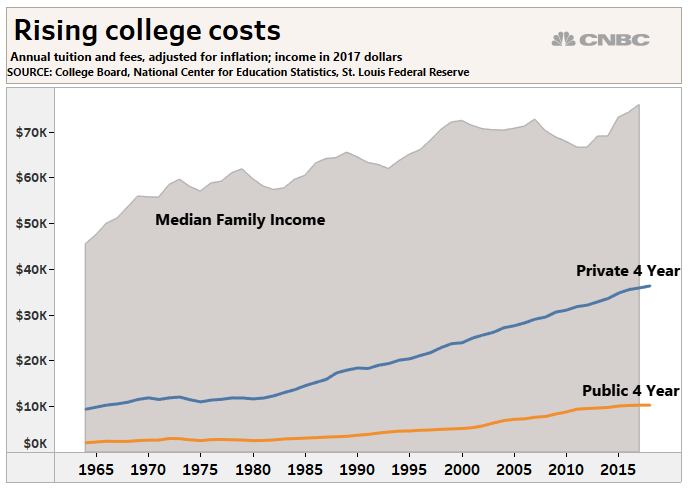The Washington Post | Getty Images
This month, thousands of high school students will submit their early action and early-decision applications to colleges.
By demonstrating a preference to a particular school, studies have shown, an early application can give you a leg up, which goes a long way with competition that’s as fierce as it has ever been.
Early-decision applicants were accepted 62% of the time, versus 52% for all applicants, according to the National Association for College Admission Counseling’s most recent State of College Admission report.
By many measures, applying early helps the prospective college student as well as the schools they wish to attend, yet the advantages are not shared equally.

Whether it’s nonbinding early action or early decision, which is binding, the deadlines for these types of applications are typically between Nov. 1 and Nov.15, or even earlier for rolling admission.
For colleges, enticing students to apply early has several benefits, which is why more schools, including Tulane University and the University of Michigan, offer the option.
“A lot of schools are trying to jump ahead of other schools by presenting the application options sooner,” said Eric Greenberg, president of Greenberg Educational Group, a New York-based consulting firm.
“As a practical matter, if a student applies early and gets in, it’s much more likely they will say yes and apply to fewer schools at regular decision,” Greenberg said.
Increasing the likelihood that a student will say yes improves a college’s yield — or the percent of students who choose to enroll after being admitted — which is an important statistic for schools.
After Tulane announced in 2016 it was adding an early decision option, the number of applicants spiked and its admission rate fell, making it even more selective. That caused Tulane’s yield to improve dramatically.
In addition, getting a head start on the makeup of the freshman class helps admissions officers balance out enrollment needs with financial aid requests.
“It gives them a cheat sheet if they know two-thirds of the class ahead of time,” said Michael Horn, author of college guide “Choosing College.”
As a result, more schools are offering an early application option, and those institutions are accepting more students ahead of the regular decision deadline.
Between fall 2016 and fall 2017, colleges reported an average increase of 4% in the number of early-decision applicants and 5% in early-decision admissions, the National Association for College Admission Counseling found.
More from Personal Finance:
To get into a top college, your character matters, too
Here’s what attending a top college is worth
To get more college aid, file the FAFSA sooner
“Schools that might have been admitting, at best, 10% early 20 years ago may be taking 30% to 40% now,” said Robert Franek, The Princeton Review’s editor-in-chief and author of “College Admission 101.”
That also means there are fewer spots later on — as well as fewer scholarships to go around.
When it comes to financial aid, it’s the early bird that wins. Some financial aid is awarded on a first-come, first-served basis, or from programs with limited funds. The earlier families apply, the better the chance to be in line for that aid, according to Ashley Boucher, a spokeswoman for Sallie Mae.
Further, the students who are applying early likely need financial aid less, and as a result, leave fewer funds for the families that need it more.
“This is a highly counseled student and family to do these things much earlier,” Franek said. “Other students may not know about this channel or how to navigate it.”
Still, that doesn’t mean that more students should feel pressured to apply early, Horn said.
“It’s a great idea if you are certain that’s where you want to go,” he said. However, “it’s a terrible move if you are only doing it because you think supposed to.”
Some high school seniors could benefit by spending more time choosing a school with the right fit, Horn said.
“Don’t commit if you are not actually committed in the heart or mind.”
